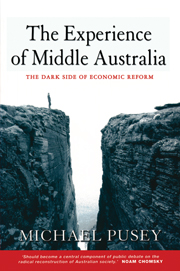Book contents
- Frontmatter
- Contents
- List of Illustrations
- Preface
- Abbreviations
- Chapter 1 The Experience of Economic Reform
- Chapter 2 Incomes and Their Meanings
- Chapter 3 Jobs, Work and Fairness in the Wake of Labour Market Reform
- Chapter 4 Working Families: Struggling with the Costs of Reform
- Chapter 5 Civil Society and Communities
- Chapter 6 Politics, Power and Institutions
- Chapter 7 Judgements on Economic Reform
- Appendix A Chronology of Economic Reform
- Appendix B Methods and Procedures: Middle Australia Project
- Appendix C Supplementary Tables
- Appendix D Income and Equivalent Household Income
- Notes
- Index
Appendix D - Income and Equivalent Household Income
Published online by Cambridge University Press: 22 September 2009
- Frontmatter
- Contents
- List of Illustrations
- Preface
- Abbreviations
- Chapter 1 The Experience of Economic Reform
- Chapter 2 Incomes and Their Meanings
- Chapter 3 Jobs, Work and Fairness in the Wake of Labour Market Reform
- Chapter 4 Working Families: Struggling with the Costs of Reform
- Chapter 5 Civil Society and Communities
- Chapter 6 Politics, Power and Institutions
- Chapter 7 Judgements on Economic Reform
- Appendix A Chronology of Economic Reform
- Appendix B Methods and Procedures: Middle Australia Project
- Appendix C Supplementary Tables
- Appendix D Income and Equivalent Household Income
- Notes
- Index
Summary
Throughout the book a measure of equivalent per capita household income is used instead of raw income data, as this is considered to be an inadequate measure of standard of living. Standard of living, expressed as economic welfare, can be considered as the resources individuals have available for consumption. This is often measured as gross domestic product (GDP) per capita. At the micro level, the unit of analysis is the household.
However, raw income does not provide an acceptable measure of standard of living, as it must be divided among the members of the household. Larger households have fewer per capita consumption resources than smaller households earning the same income. Dividing total income by the number of household members would provide a measure of per capita income, but would not take into account the economies of scale obtained by household members cooperating in the use of their resources, and thus it would underestimate the standard of living of each individual. Equating welfare to potential consumption does not discriminate according to the choices made by different households, such as saving and spending on different items.
A problem may arise in the Middle Australia data, in that respondents were asked for their gross income, without deducting tax or superannuation. This will affect the distribution of equivalent income scores. For example, people on middle incomes with larger families are taxed at a high rate, which reduces their potential per capita consumption.
- Type
- Chapter
- Information
- The Experience of Middle AustraliaThe Dark Side of Economic Reform, pp. 204 - 207Publisher: Cambridge University PressPrint publication year: 2003



